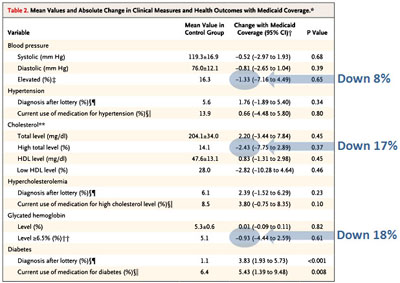Tyler Cowen links to a couple of writers today who say the recent study of the Oregon Medicaid experiment was bad news for Medicaid fans because it showed that Medicaid coverage had no effect on most of the medical conditions that were studied. His summary:
Do read the rest of those posts for a more complete picture of the results, but many commentators are overlooking these rather simple upshots.
It’s disappointing to keep reading this stuff, because it’s flatly not true. There are three main takeaways from the study:
- There were positive results on some measures (depression, financial security, rates of diagnosis).
- There were also positive results on all of the other measures studied (blood pressure, diabetes, cholesterol).
- But the size of the study was too small to determine if the positive results in #2 were real. This says nothing at all about Medicaid. It
 just says that, unfortunately, the experiment was too small to be definitive.
just says that, unfortunately, the experiment was too small to be definitive.
In addition, the study says nothing at all about some more fundamental questions. Is Medicaid well run? Does it deliver better performance per dollar than some other programs? Are there useful ways it could be reformed? Even if the results from #2 turn out to be real and significant, are they worth the cost? For that matter, is healthcare in general worth the price we pay in America? Those are all great questions that we should spend a lot of time investigating, but this particular study simply says nothing one way or the other about any of them. Strictly in terms of how effective Medicaid is, Austin Frakt and Aaron Carroll have it right when they tell us how much this study should change our thinking: “Not that much.”
Speaking for myself, I’d also repeat—over and over and over until at least one person responds to this—that the study looked only at a few easily measurable chronic conditions. These are important, but they’re not the bulk of what medical care is about. Most of it is about routine preventive care and acute problems: broken bones, infections, flu shots, immunizations, etc. etc. I’m genuinely puzzled by the fact that virtually no one seems to acknowledge this.
But please, please, please: don’t say the Medicaid study “showed no effects.” It ain’t true. It showed positive effects, but it was too small and underpowered to tell us for sure if these positive effects were real. That’s it.













